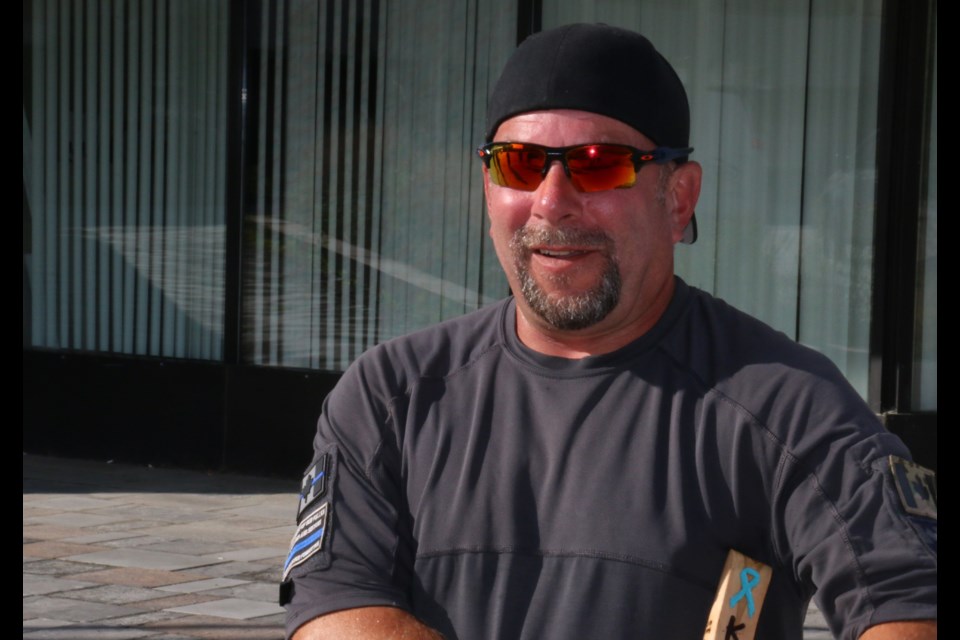Emergency workers and members of the first response community in Sudbury were out Wednesday morning to welcome an Alberta man who is on a cross-Canada walk to raise awareness of the struggles of PTSD (Post-Traumatic Stress Disorder).
Chad Kennedy walked through part of Sudbury along Lorne Street and then Brady Street. Greater Sudbury Police spokesperson Kaitlyn Dunn said Kennedy was meeting with local first responders, including police, fire and ambulance, during a private meet-and-greet at Tom Davies Square this morning.
Kennedy is a member of the Alberta Sheriff Highway Patrol, but is currently on medical leave as he was diagnosed with PTSD, a condition that he said was the result of dealing with accumulated stressful incidents since he joined law enforcement in 2004.
His mission with the walk is to raise awareness of PTSD and other mental health struggles faced by first responders.
Kennedy's website, Sea to Sea For PTSD, states part of the effort is also to raise funds to help those who need treatment and to assist in creating education programs for loved ones and friends.
Speaking with Sudbury reporters, Kennedy described his struggle.
"So a few years ago in 2018 I was diagnosed with post-traumatic stress (disorder) and it was accumulated through the atrocities I've seen over the years and during my career," said Kennedy. "I got some really bad help shortly after I asked for help."
Kennedy said he decided to keep going to work.
"I just sort of pushed everything off to the side and accepted that this is what I signed up for, which is so wrong."
One day things got worse. It was July of 2020 and a tourist bus had crashed and rolled over on the Columbia Icefield in Jasper National Park. Three people died. More than a dozen others were injured.
"I was one of six law enforcement officers that were first on scene to a mass casualty bus rollover without resources, we didn't have fire, we didn't have EMS," Kennedy said.
He had a rough time dealing with it, he said.
"So basically two weeks after the fact I sat in the backyard, contemplating life, and really had made the decision that I've had enough. People aren't understanding what I go through. And for whatever reason, the idea of walking across Canada popped into play. And it's just been an amazing part of my healing journey. It's allowed me to gain the strength to ask for help again, and get that right help."
Kennedy said his situation has been repeated hundreds and hundreds of times with first responders across Canada. He said he wants to see more mental health discussions held in the first response community as well as the military community, since he is also a former member of the Canadian Forces.
"We face the stigma in our work environments that if we speak about mental health or anything that has hurt us or upset us, that we are weak," Kennedy said.
The truth he said is that first responders are among the strongest and most resilient people in society.
"But we're also so afraid to be shunned by others and beat down emotionally and judged," Kennedy said.
Many people look at first responders as the fixers, the heroes in society.
"In reality when our Superman or Wonder Woman uniform comes off at the end of the day, we're human beings,' Kennedy said.
"We encounter stuff that the rest of society will never encounter. And it's okay not to be okay. It's okay to be able to ask for help."
Kennedy said things are changing for the better. He said as recently as 15 years ago, PTSD was considered a military injury, something that affected only those who had been in war zones in foreign countries. He said the situation is evolving and leadership and management of first responders in the civilian world are beginning to understand.
One thing Kennedy has discovered so far on his walk that began in British Columbia on April 4 is that far too many individuals and their families are struggling with PTSD. He said many of them have shared their stories with him in the past couple of months.
"Yes, and with brutal, brutal honesty. Yeah, it's humbling," said Kennedy.
"I'm a stranger and you know I hope that I represent everybody that has this challenge that people have felt that they can open up to me," he said.
"It's heartbreaking especially when we are talking to the loved ones of those who have died by suicide because of this horrible demon."
Len Gillis covers health care and mining for Sudbury.com.
